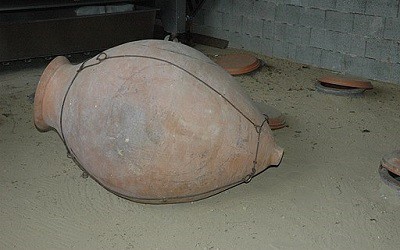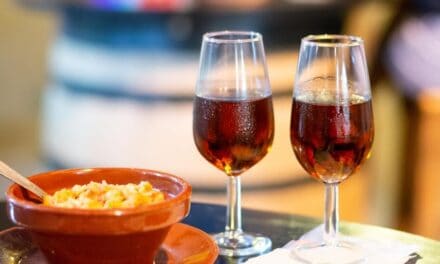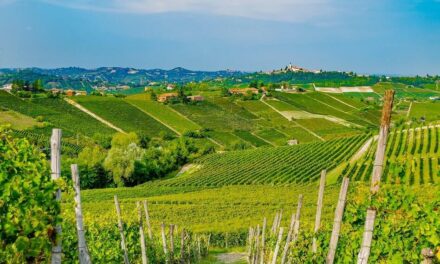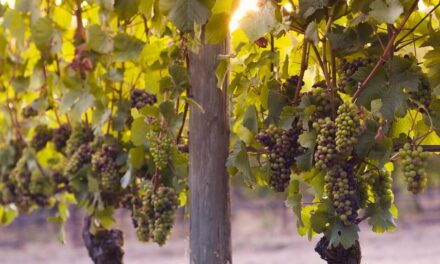When asked about the different types of wine they know, most people name reds, whites, and rosés. And that’s perfectly reasonable as the vast majority of bottles belong to one of these categories. But actually, there is another type that only a few wine lovers know about: orange wine.
Orange wine is a white wine that undergoes a red wine production process. It’s made from white grapes but typically has many characteristics of red wine. These include a higher level of tannins, a fuller body, and a more complex flavor profile.
Its name might be confusing for wine lovers. Some believe it refers to the wine’s color; others think it points to the ingredients used for making it. If you want to know where the name orange wine comes from, how it is made, and how it tastes, keep reading.
WHAT IS ORANGE WINE MADE FROM?
Vintners use white grapes to produce orange wine. There are no fixed rules regarding the varietals, so they can use any white variety.
Orange wine is not made from oranges. That is a common misconception, but the delicious citrus fruits do not play any role in making orange wine.
HOW IS ORANGE WINE MADE?
Although white grapes are the base ingredient for orange wine, the production includes steps typical for making red wine. The most important one is the fermentation and maceration process. And it also explains why orange wine is orange.
During the maceration, the wine gets its color. And no matter what type of wine it is, grape solids play a crucial role. Solids include grape skins, stems, and seeds. They contain chemical compounds that cause the wine to turn red.
When making red wine, vintners allow these solids to stay inside it to color it. It’s different for white wine: Before starting the fermentation, winemakers separate the grape solids from the wine. Thus, white wine typically has a pale yellowish color.
Unlike white wine producers, vintners who make orange wines don’t separate the grape solids from their wines. So the solids’ chemical compounds can do their job and color the wine. Typically, this maceration process takes several weeks or even months.
Depending on the precise duration, the wine ends somewhere between light orange and dark amber. Because of this process, wine experts put orange wine in the category of “skin-contact wine”.
Some wines mature in oak barrels after fermentation for several months to a few years.
The Qvevri Method
A unique way to produce orange wine is the Qvevri Method. It was developed in Georgia, a small country in Eastern Europe. As Georgians have been making wine for almost 8000 years, many people consider it the birthplace of wine. Today, some of the world’s best orange wines come from Georgia.
A Qvevri is a large, egg-shaped vessel made from clay. It has a capacity of 100 to 3,500 liters. Winemakers bury these vessels in the ground, so only the opening is visible.
The Georgian production method of orange wine is special in some aspects:
- After crushing the grapes, the whole winemaking process, including fermentation and aging, takes place in the Qvevri.
- The fermentation happens without any intervention, and vintners use only naturally occurring yeast.
- The grapes’ solids stay inside the wine for several months to impart color to the wine.

Bauer Karl / CC BY 3.0 AT
While the Georgians also use the Qvevri Method to make red and white wines, their orange styles are the country’s most famous wines.
HOW DOES ORANGE WINE TASTE?
It’s hard to define a universal flavor profile for orange wines. Based on the grape variety that vintners use, the wines’ flavors can differ significantly from each other. Some have aromas of dried flowers or herbs; others feature stone fruit flavors like apricots, nectarines, or peaches. You might also sense nuts and honey. Sometimes, the wines have sour notes that remind you of fruity draft beers.
Despite the varying flavor profiles, many orange wines share some characteristics. Most of them are dry and often similarly acidic as white wines. On the other hand, they tend to be higher in tannins and fuller-bodied, just like red wines. The longer the maceration lasts, the bolder and more tannic they are.
Few orange wines are sweet, just like a dessert wine. In particular, wines made from the Orange Muscato variety tend to belong to this category. They combine sweet and spicy flavors of citrus and stone fruits with a full body and subtle acidity.
HOW IS ORANGE WINE DIFFERENT FROM ROSÉ WINE?
In terms of grapes and production processes, orange wine is quite the opposite of rosé wine. Rosé wine is made from red grapes, but vintners limit their maceration time consequently. Thus, the grapes can only give a bit of color to the wine. The results are wines that are pale salmon-colored to bright pink.
Orange wines are made from white grapes, but they undergo extensive maceration. Therefore, their colors are more saturated.
Besides their colors, there are other differences between the two. On average, orange styles have fuller bodies, more complex bouquets, and higher tannin levels. In contrast, rosés are light, low in tannins, and offer rather subtle flavors.
ARE ORANGE WINES NATURAL WINES?
Not all orange wines are natural. Unfortunately, there is no official definition of natural wines. But most of them are unfiltered, free of additives such as sulfites, and made from organic or biodynamic grapes. Many but not all orange wines have the same characteristics. So the blanket claim that orange wines are natural is not correct.
HOW TO SERVE ORANGE WINE?
Orange wines are great with food, so it is perfectly fine to serve them with the main course of your dinner. But you can also enjoy them on their own on a warm summer day. In any case, the right serving temperature and the proper glass are essential.
What Is the Right Serving Temperature for Orange Wine?
Orange wine is best when it’s slightly cooler than red wine but warmer than white wine. Serve it at a temperature between 50 and 55°F (10-13°C). That is just right to allow the wine to showcase its complexity but not too cold to mask its delicious flavors.
What Is the Right Glass for Orange Wine?
Orange wines are significantly bolder and more complex than white wines. Standard white wine glasses do not allow enough oxygen into the bowl because they are too small. So they cannot support the wine to release its aromas and rise to its full potential.
A Chardonnay glass has a larger bowl, and thus it is a more appropriate vessel for orange wine. For very complex orange wines, you might even use a Sauvignon Blanc glass, which is even bigger.
If you own neither of these glasses, go for a standard red wine glass.
Should You Decant Orange Wine?
Orange wines benefit from decanting, but it’s important not to overdo it. For most styles, 15 minutes are absolutely sufficient to help them release their aromas. If your wine is very tannic, you can extend the decanting to 30 minutes.
HOW TO STORE ORANGE WINE?
Just like other wines, orange wine needs a dark, cool storage place. Protect it from sunlight, sudden temperature changes, and vibrations, and it will be fine.
Can Orange Wine Be Aged?
Some orange wines have aging potential. Especially those that underwent an aging period in oak barrels can improve over time. However, the differences you might sense after extended storage are relatively marginal. So you might want to enjoy your orange wine sooner rather than later.
Can Orange Wine Go Bad?
Orange wines can go bad when exposed to sunlight, heat, or vibrations. If they smell like vinegar, you should not drink them anymore.
How Long Does Orange Wine Last When Open?
After you open a bottle of orange wine, it lasts for about one week. You have to store it properly, though: Reseal the bottle and put it into the refrigerator.
ORANGE WINE FOOD PAIRING
Because of their tannins and medium to full body, orange wines pair surprisingly well even with savorier foods. Maybe not as fatty as a ribeye steak, but they can definitely stand roasts, all types of fish, savory sauces, stews, and cheese and meat plates.
To find the perfect pairing for your wine, consider the aromas you sense. For instance, flavors of dried fruits pair well with grilled game or poultry, and herbal notes are great with salty cheeses.
Wines made from aromatic varietals like Gewürztraminer, Riesling, or Moscato tend to be dry but feature sweet smells. This exciting combination is an excellent match for spicy food. Think of curry dishes, Korean kimchi, and meals from Indonesia or Thailand.
ORANGE WINES SHOPPING TIPS
Finding orange wines might be a bit challenging for several reasons. First, they are still rare, and only a few wineries produce them. And second, there is no consistent naming convention, so they can have various names. If you find one of the following terms on the bottle label, that is a good hint:
- Orange
- Skin Contact
- Skin Fermented
- Amber Wine
- Amber Natural Wine
Vintners all around the world produce orange wines. The following bottles are worth opening:
Domaine Tatsis Roditis: This biodynamic wine from Macedonia is the right choice for every wine lover who is into experimenting. It is made from 100% Roditis grapes, a widespread varietal in Eastern Europe. Aromas of peach, honey, and spices trick you into expecting a sweet wine. But actually, it is bone-dry with smooth tannins.
Anne Pichon Sauvage Orange: This French wine from the Côtes du Ventoux region is a blend of multiple varietals. It features a variety of fruity aromas, including apple and citrus, and a refreshing acidity.
Quady Essensia Orange Muscat: As mentioned before, some orange wines belong to the dessert wine category. And this wine from California is a great example. It is deliciously sweet with aromas of apricot, pear, and (indeed) oranges.
More wines to look for:
- Field Recordings Skins 2020 (California)
- Gerard Bertrand Orange Gold 2020 (France)
- Domaine Glinavos Paleokerisio (Greece)

Domaine Tatsis Roditis 2015
$32.99
from: Wine.com
FINAL WORDS
After reading this article, you know why orange wine is orange, and that it is not made from oranges. And hopefully, you also conclude that it is a very interesting beverage worth trying. Remember that buying these wines also supports vintners working sustainably without chemical additives.






